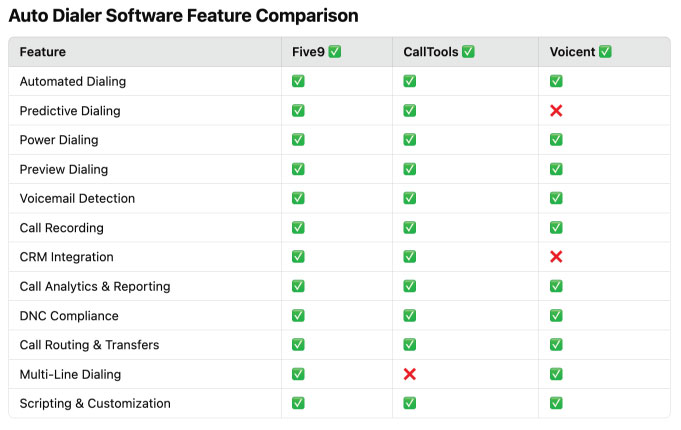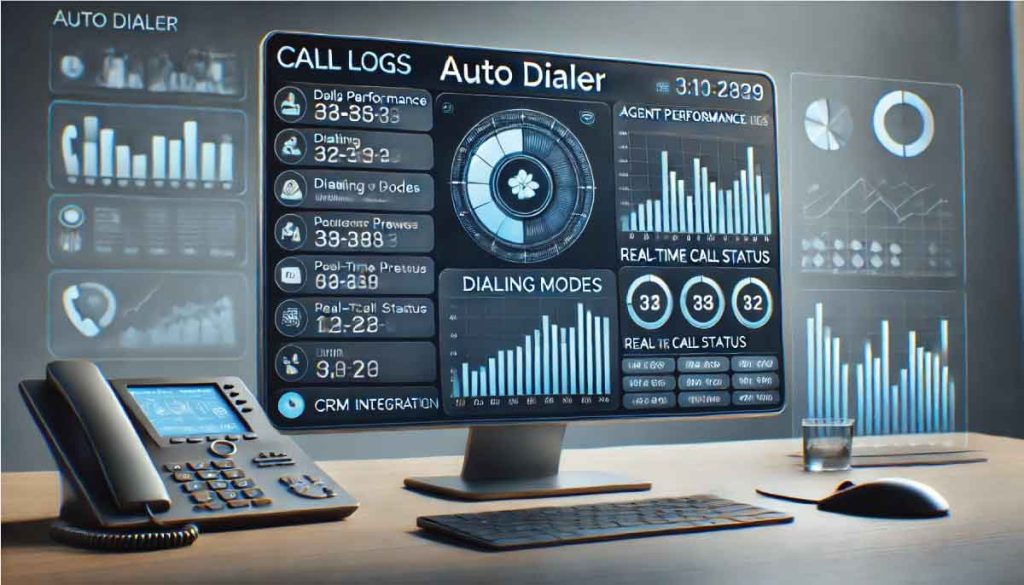Auto dialer software automates outbound calling for businesses, reducing manual dialing time and improving call efficiency. It is widely used in telemarketing, customer support, and sales operations to streamline communications. Modern auto dialers offer features like predictive dialing, CRM integration, and compliance tools to enhance productivity.
Popular auto dialer solutions include Five9, CallTools, Voicent, and Aircall.
Related software categories include call center software, predictive dialer software, and sales engagement platforms.

Five9 – A cloud-based contact center platform offering predictive dialing, call routing, and AI-driven analytics.
CallTools – Provides power and predictive dialing features with real-time analytics and CRM integration.
Voicent – Offers a flexible auto dialer with voicemail detection and call recording.
Aircall – A business phone system with smart dialing and CRM syncing capabilities.
RingCentral Engage – A robust communication solution with auto dialer functions for sales and support teams.
VanillaSoft – Specializes in sales acceleration with auto dialing, call scripting, and lead management.
Dialpad – AI-powered calling software with automated dialing and real-time transcription.
Talkdesk – An enterprise contact center solution with AI-driven automation and analytics.
CloudTalk – A cloud-based calling solution with auto dialer capabilities, smart call routing, and CRM integration, designed for sales and customer service teams.
PhoneBurner – A power dialer platform that automates outbound calling, voicemail drops, and follow-ups while providing real-time analytics and CRM connectivity.
Convoso – An AI-driven auto dialer that enhances call center efficiency with predictive dialing, lead prioritization, and compliance automation.
The following table compares key features across three leading auto dialer software solutions: Five9, CallTools, and Voicent. This comparison helps businesses choose the right solution based on their needs.

The feature comparison chart highlights the strengths and limitations of Five9, CallTools, and Voicent, three leading auto dialer solutions. Five9 emerges as the most feature-rich option, supporting all key functionalities, including predictive dialing, CRM integration, and multi-line dialing, making it ideal for high-volume outbound operations. CallTools also offers robust capabilities but lacks multi-line dialing, which may slightly reduce efficiency for organizations prioritizing call throughput. Voicent, while still a strong contender, does not support predictive dialing or CRM integration, which could limit its effectiveness for large sales teams needing automated lead management.
Overall, businesses seeking a comprehensive, AI-powered auto dialer should consider Five9, whereas CallTools provides a solid balance of automation and analytics. Voicent is a more cost-effective choice for smaller teams that do not require advanced dialing strategies.
If you’re looking to streamline your outbound calling and improve efficiency, this video is a must-watch. It breaks down the top auto dialer software options for small businesses, comparing their features, pricing, and usability. You’ll learn how different dialing modes—such as predictive, power, and preview dialing—work and which one suits your business needs. The video also covers CRM integration, compliance tools, and call analytics, helping you understand how auto dialer software can boost sales, enhance customer engagement, and save time. Whether you’re new to auto dialers or looking to upgrade, this video provides valuable insights to help you make the right choice.
This image showcases a modern Auto Dialer Software dashboard, designed to enhance outbound calling efficiency. The dashboard provides key insights such as call logs, agent performance metrics, and real-time call status, helping businesses monitor and optimize their dialing campaigns. It includes various dialing modes (predictive, power, and preview) to suit different calling strategies, along with CRM integration for seamless customer management. Visual elements like graphs, charts, and analytics panels offer a clear overview of call activity, making it easier for teams to track performance and improve outreach effectiveness.

Auto dialer software incorporates various dialing modes and automation tools to optimize outbound calling. Features such as predictive dialing, call routing, and CRM integration enhance efficiency and compliance. The following sections explore these features in depth.
Below, we expand on the essential features that make Auto Dealer Software a vital tool for modern automotive dealerships.
Auto dialers eliminate the need for manual number entry, dialing numbers from a preloaded list and connecting agents only when a live person answers. This reduces idle time and increases agent productivity.
Predictive dialers use machine learning algorithms to determine when an agent will be available and proactively dial numbers accordingly. This minimizes wait times and maximizes talk time per agent.
Unlike predictive dialers, power dialers call the next number on a list only after an agent finishes the current call. This ensures better control over call pacing while maintaining efficiency.
Agents can review customer information before a call is placed, allowing them to personalize interactions and improve engagement rates. This is particularly useful for high-value sales calls.
Auto dialer software can detect voicemail systems and either skip them or leave a pre-recorded message. This prevents agents from wasting time on unanswered calls.
Many auto dialers offer built-in call recording features to help businesses monitor calls, ensure quality control, and meet compliance standards. Recordings can be stored for future reference or training purposes.
Seamless integration with CRM platforms like Salesforce or HubSpot allows businesses to track customer interactions, manage leads, and improve customer relationships.
Auto dialers provide reports on call durations, answer rates, and conversion metrics, helping businesses analyze performance and refine their calling strategies.
To avoid regulatory violations, auto dialers cross-check numbers against Do Not Call lists and automatically filter out restricted contacts before dialing.
Calls can be routed based on agent availability, skill level, or customer requirements, ensuring that each call is handled efficiently.
Some auto dialers allow simultaneous dialing of multiple numbers, connecting the agent to the first answered call while dropping unanswered attempts. This boosts overall call volume.
Agents can use predefined scripts and workflows, ensuring consistent messaging and adherence to best practices during calls.
An auto dialer is a software tool that automatically dials phone numbers from a list and connects live calls to agents, improving outbound calling efficiency.
Industries such as telemarketing, sales, customer service, healthcare, and debt collection use auto dialers to streamline communications.
Predictive dialers use algorithms to estimate agent availability and dial multiple numbers simultaneously, ensuring minimal downtime.
Yes, advanced auto dialers use voicemail detection to skip or leave pre-recorded messages on answering machines.
Yes, but businesses must comply with laws like the TCPA and DNC regulations to avoid penalties.
Many auto dialers integrate with CRM platforms to manage customer interactions and track lead progress.
Power dialing calls one number at a time when an agent is free, while predictive dialing dials multiple numbers to maximize talk time.
Some solutions include inbound call management, routing calls to agents based on availability.
cloud-based vs. on-premises). For small businesses, entry-level cloud-based auto dialers start at $20 to $50 per user per month, typically including power dialing, call recording, and basic reporting. Mid-tier solutions with predictive dialing, CRM integration, and advanced analytics range from $75 to $150 per user per month. Enterprise-grade auto dialers with AI-driven analytics, omnichannel support, and compliance automation can cost $200 to $500 per user per month, especially when bundled with a full contact center solution. Some vendors also charge per-minute fees or offer tiered pricing based on call volume.
AI-powered auto dialers optimize calling efficiency by leveraging machine learning algorithms to improve lead prioritization, call pacing, and customer engagement. AI-driven predictive dialing continuously analyzes agent availability, call durations, and customer behaviors to dynamically adjust dialing rates, minimizing agent idle time while reducing dropped calls. Additionally, AI enables speech analytics to assess tone, sentiment, and keywords in real-time, providing agents with live coaching or automatically tagging calls for follow-up. Some AI-enabled auto dialers can even generate personalized scripts, detect compliance risks, and automate voicemail responses, making them essential for high-volume outbound operations.
Auto dialers must comply with several regulatory frameworks, such as the Telephone Consumer Protection Act (TCPA) in the U.S., the General Data Protection Regulation (GDPR) in the EU, and various Do Not Call (DNC) lists worldwide. Compliance features in auto dialer software include automatic DNC list scrubbing, ensuring numbers flagged on national and internal lists are not dialed. Additionally, many dialers implement consent tracking, requiring explicit opt-in permissions before calling. AI-driven compliance monitoring can also detect forbidden phrases, enforce call recording disclosure, and automatically pause recording during sensitive data collection. Companies operating internationally must consider time zone-based dialing restrictions, ensuring calls are only made within legally allowed hours for each region. Failing to comply can result in severe penalties, such as multi-million-dollar fines and legal action.